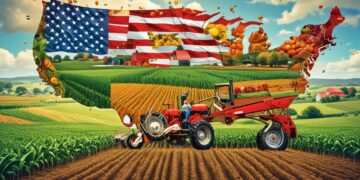The use of blockchain in strengthening American agricultural product exports

Overview of Blockchain Benefits in Agriculture
The adoption of blockchain technology in agriculture significantly enhances the export capabilities of American farmers and distributors. This cutting-edge system functions as a digital ledger that provides detailed records of each step in the supply chain. By embracing these advancements, American agriculture can effectively meet rising global demands while maintaining high standards of quality and safety.
Enhanced Traceability
Enhanced traceability is one of the foremost advantages of blockchain technology. Each transaction, whether it’s the harvesting of crops or the shipment of products, is recorded and stored in real-time. For instance, a consumer could scan a QR code on a food product to trace its origin back to a specific farm, learning about the farming practices and conditions under which it was grown. This level of transparency not only assists in building consumer confidence but also helps ensure compliance with regulations that govern food safety.
Improved Safety
Improved safety protocols benefit significantly from blockchain integration. In the event of a food safety scare, such as a contaminant discovered in a batch of lettuce, blockchain allows for rapid identification of affected products. This capability can minimize health risks by enabling companies to quickly remove contaminated goods from shelves. For example, in 2018, blockchain technology helped expedite the recall of romaine lettuce linked to E. coli outbreaks, saving lives and preserving consumer trust.
Increased Efficiency
Increased efficiency translates to streamlined operations and reduced costs. Blockchain technology automates various transactions and minimizes the reliance on paper-based documentation. This reduces the time spent on paperwork, thus allowing farmers and exporters to focus more on production and customer relationships. By using smart contracts, which automatically execute transactions when conditions are met, exporters can significantly cut down on transaction times and errors.
Furthermore, employing blockchain can unite various stakeholders within the agricultural supply chain—farmers, distributors, and regulatory bodies—under a singular, reliable framework. This collaborative approach not only enhances communication and accountability but also leads to a significant reduction in disputes and delays.
Building Consumer Trust
By establishing trust through transparency and accuracy, blockchain technology positions American agricultural products as premium offerings in a competitive market. Consumers are increasingly eager to know the origins of their food and the ethical standards observed during production. The ability to provide verifiable information through blockchain adds credibility to American exports, which can lead to increased sales and market stability.
Strategic Growth in Exports
As the global market shifts and competition intensifies, strategic application of blockchain technology places American agriculture at the forefront of innovation. This adaptability is crucial not only for meeting current consumer preferences but also for setting the stage for future growth and sustainability. By investing in blockchain, American farmers and exporters can leverage technology to boost their market presence globally, enhancing their potential for success in an evolving landscape.
CHECK OUT: Click here to explore more
Implementing Blockchain for Agricultural Exports
To effectively leverage blockchain technology in American agricultural exports, stakeholders must adopt a systematic approach. This integration can be broken down into several key steps that ensure all involved parties—farmers, exporters, and consumers—benefit from improved operations and outcomes.
Step 1: Educate Stakeholders
The first step involves educating all stakeholders about the benefits of blockchain technology. This education could take the form of workshops, training sessions, and informative materials that detail the mechanics of blockchain and its implications for agriculture. A well-informed base enables stakeholders to utilize this technology to its full potential. Educational initiatives should encompass key topics such as:
- Understanding Blockchain: It is crucial to explain what blockchain is, including its decentralized nature and its capability to secure transactions. Highlight its relevance in agriculture by discussing examples like crop provenance tracking, allowing consumers to verify the source of their food.
- Benefits of Traceability: Emphasize how enhanced traceability not only improves product quality but also increases consumer trust. For instance, if a lettuce batch is contaminated, blockchain allows for quick identification and recall, minimizing health risks as well as economic loss.
- Compliance and Safety: Discuss how blockchain helps support regulatory compliance and food safety protocols. For example, in the event of a food safety violation, companies using blockchain can quickly provide documentation to authorities, reducing potential fines and maintaining public credibility.
Step 2: Choose the Right Blockchain Solution
Selecting a suitable blockchain platform is crucial for successful implementation. Different platforms cater to varied agricultural needs, such as supply chain management and product traceability. When choosing a blockchain solution, consider the following:
- Scalability: Ensure that the platform is capable of growing along with your business operations, so future expansion does not exceed the software’s capabilities.
- Interoperability: The chosen solution should integrate smoothly with existing systems utilized by stakeholders, avoiding disruptions during the switch.
- User-Friendliness: Opt for a straightforward solution that minimizes the learning curve, allowing all parties—including farmers who may be less tech-savvy—to adapt quickly.
Step 3: Implement Smart Contracts
Smart contracts are essential for streamlining processes within the agricultural supply chain. They automatically execute transactions when predefined conditions are met, thus enhancing efficiency and reducing the likelihood of errors. By integrating smart contracts, American agricultural exporters can:
- Streamline Transactions: Automate payment and delivery processes, ensuring that all parties receive their transactions on time.
- Reduce Disputes: By documenting the terms and conditions in the blockchain, misunderstandings are minimized, making it easier to resolve conflicts.
- Enhance Accountability: By providing an immutable record of each transaction, smart contracts foster accountability among participants, which is vital for building trust.
Step 4: Collaborate with Industry Partners
Finally, effective integration of blockchain necessitates collaboration among industry partners, such as distributors, retailers, and regulatory bodies. Engage these stakeholders to:
- Share Data: Establish secure agreements for data sharing across the blockchain, which is vital for transparency.
- Align Goals: Coordinate efforts to enhance efficiency and compliance, framing a shared objective for all parties involved.
- Conduct Pilot Programs: Testing the system in controlled settings is vital to identify issues and refine processes before wider implementation.
By systematically implementing these steps, American agricultural stakeholders can maximize the potential of blockchain technology. This approach not only enhances their competitiveness in the global market but also ensures the integrity and safety of their products, ultimately benefiting consumers and producers alike.
CHECK OUT: Click here to explore more
Enhancing Global Reach Through Blockchain
The integration of blockchain technology in American agricultural exports extends beyond secure transactions and traceability. It also presents opportunities for innovative marketing strategies, better access to global markets, and a significant increase in consumer engagement.
Step 5: Leverage Data Analytics
With blockchain, vast amounts of data can be securely collected and analyzed. Utilizing data analytics tools can empower American agricultural exporters to understand market trends, consumer preferences, and pricing strategies effectively. Here’s how to implement this:
- Utilize Real-time Data: Gather and analyze trends in real-time to identify which agricultural products are in demand. This allows exporters to adjust their supply strategies accordingly.
- Predictive Analytics: Use data to forecast future market demands and potential disruptions in the supply chain, enabling proactive decision-making.
- Benchmarking: Compare performance metrics with industry standards to gauge competitiveness and identify areas for improvement.
Step 6: Promote Sustainability Efforts
Consumers are increasingly concerned about sustainability. Blockchain provides an effective means of showcasing sustainable practices in American agriculture. Steps to promote sustainability include:
- Record Sustainable Practices: Document environmentally friendly practices, such as water conservation, organic farming, and reduced greenhouse gas emissions on the blockchain.
- Authenticity Verification: Allow consumers to verify claims of sustainability through transparent records, thereby enhancing brand reputation and loyalty.
- Engage in Certifications: Partner with certification bodies and leverage blockchain for verification processes, which can help in securing certifications like USDA Organic.
Step 7: Strengthen Relationships with International Buyers
Building trust and strong relationships with international buyers is crucial for exporting success. Blockchain can facilitate this process by:
- Enhancing Transparency: Share relevant information about product origins and supply chain processes to buyers, making them feel more secure in their purchases.
- Providing Real-time Updates: Use blockchain to give buyers updates on product status and location during transit, which helps in managing expectations and minimizes disputes.
- Streamlining Cross-border Transactions: Implement blockchain solutions that simplify payment processes and currency conversions, facilitating smoother international transactions.
Step 8: Promote Consumer Engagement
Blockchain opens numerous avenues for engaging consumers directly. American exporters can leverage technology to:
- Allow Verify Product Stories: Enable consumers to access the entire journey of their food products, from farm to table, thereby fostering loyalty and trust.
- Educate Consumers: Share educational content on blockchain and how it ensures product quality and safety, positioning brands as industry leaders.
- Create Loyalty Programs: Develop digital loyalty programs on the blockchain, where consumers can earn rewards for purchases, encouraging repeat business.
Through these actionable steps, American agricultural exporters can effectively harness the capabilities of blockchain technology. By focusing on data analytics, sustainability, international relationships, and consumer engagement, the agricultural sector can significantly enhance its global export potential, thereby contributing to the economy while ensuring the integrity of agricultural products.
SEE ALSO: Click here to read another article
Conclusion
The integration of blockchain technology in American agricultural exports is not just a trend; it is a pivotal advancement that can reshape the landscape of the industry. The benefits of blockchain can be categorized primarily into three pillars: transparency, traceability, and sustainability, each playing a critical role in enhancing the reliability and appeal of American agricultural goods on the global stage.
Transparency is fundamental in building trust among consumers and international buyers. By utilizing blockchain, exporters can provide real-time updates on product origins, processing methods, and storage conditions. For example, when consumers can access a digital ledger that details every step their food takes before reaching their plate, they are more likely to feel secure in their purchasing choices. This level of clarity can lead to increased sales and stronger loyalty to brands that utilize these technologies.
Traceability offered by blockchain enables exporters to quickly track and respond to issues such as food recalls or contamination concerns. In recent years, high-profile food safety incidents have highlighted the need for rapid response mechanisms. A blockchain-based system allows for pinpointing the source of contamination within hours, a task that could take weeks using traditional methods, thereby safeguarding public health and mitigating economic losses.
Moreover, exporters can demonstrate their commitment to sustainability through blockchain by documenting eco-friendly practices. As the market increasingly demands sustainably sourced products, having verified sustainability claims can serve as a competitive advantage. This is particularly crucial as consumers become more educated and concerned about environmental issues, such as climate change and resource depletion. A study found that over 70% of consumers are willing to pay a premium for products that are certified as sustainable, making it an essential consideration for exporters.
To effectively implement these blockchain solutions, businesses should focus on a step-by-step approach:
- Evaluate Needs: Identify specific challenges within supply chain management that blockchain can address.
- Research Solutions: Investigate various blockchain platforms designed for agriculture, focusing on those with strong support and community feedback.
- Train Stakeholders: Educate your team and supply chain partners about blockchain technology to ensure smooth adoption.
- Initiate Pilot Programs: Start small by implementing blockchain in specific product lines to assess effectiveness before a full-scale launch.
- Engage Consumers: Use consumer-friendly applications or QR codes on packaging to provide transparency regarding food provenance and sustainability.
By embracing these practical steps, American exporters can not only enhance transaction security but also tap into new markets, all while contributing to the health and sustainability of the agricultural sector. The adoption of blockchain is an opportunity not to be overlooked, as it could play a crucial role in the future growth of the American economy.

James Carter is a financial writer and consultant with expertise in economics, personal finance, and investment strategies. With years of experience helping individuals and businesses navigate complex financial decisions, James provides practical insights and analysis. His goal is to empower readers with the knowledge they need to achieve financial success.





